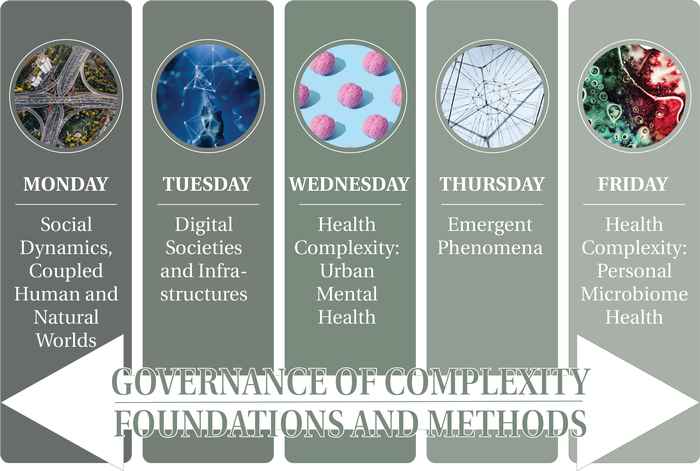We regularly host and organise events to spark ideas, exchange knowledge, facilitate networking and create new research partnerships. Events at the IAS are typically small-scale in an almost 'homely' ambiance, offering researchers a haven to ponder, debate and reflect. Find an overview of our events on our events page.
Updates about our community can be found on our news page. Subscribe to our Newsflash newsletter and stay informed about IAS news, events and opportunities. Past editions of the newsletter are available in our Newsflash archive.

Research groups at IAS
Approaching societal, scientific, or policy problems from a complexity perspective requires joining forces from different fields, in terms of methods, concepts, theoretical frameworks, and data. At IAS we therefore host 5 different research groups that are working on a specific thematic day during the week. If you are interested in working with one of the groups at IAS, please contact the coordinator of the group.
| Monday | Population-Scale Social Network (POPNET) POPNET is a novel digital infrastructure and research community with the aim of unlocking longitudinal social network data on the entire population of the Netherlands for academic research purposes. It enables new exciting research in an anonymized as well as ethically and legally responsible manner. This research may lead to actionable insights into key issues including segregation, substantive social change, and UN sustainable development goals such as reducing inequality. More information Coordinator: Jayshri Murli |
| Tuesday |
AI, Media & Democracy Lab |
| Wednesday |
Centre for Urban Mental Health |
| Thursday | Dutch Institute for Emergent Phenomena (DIEP) The Dutch Institute for Emergent Phenomena (DIEP) is an interdisciplinary research centre across fundamental sciences with the purpose of furthering the understanding of emergent phenomena. Its goal is to create an interdisciplinary research programme that covers subjects such information theory, topological phases of matter, multiscale modelling, networks, complex systems, emergence of causality, non-equilibrium systems, collective intelligence, among many others. More information Coordinator: Jácome Armas |
| Friday | Personal Microbiome Health Starting in September 2022, IAS has become the host of the new METAHEALTH concortium (funded by NWA-ORC) to investigate health in a microbial, sociocultural and care context in the first 1000 days of life. It brings together expertise on the oral and gut microbiome with expertise in public health, social and behavioral sciences, and complexity and data science in order to advance cutting-edge research in the complex field of microbiome science. More information Coordinator: Kaylee Sitek |